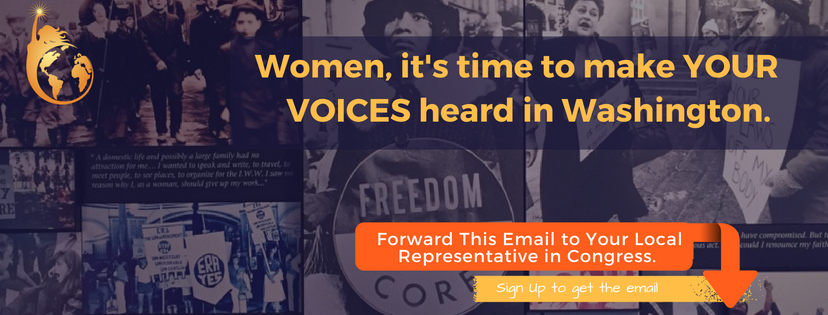
This year feels different already. It’s a big month for all of us, and we are being called to own our power. This year, as a member of the Women Igniting Change™ movement, you’ll get the right tools to take action now. So let’s get right to it.
The Women’s March on Washington happens on January 21st, and many of us will be there. This is one big step in the right direction for the Women’s Rights Movement – it’s an act of solidarity, an awareness builder, and a way to inspire action. But there has been criticism of the march not having a solid focus and possibly being ineffective…
NPR reported, “A single event, while important to rally on a grass-roots level, is often politically ineffective in its immediate aftermath — it can take years to figure out how a demonstration like the Women’s March will inform public policy, if at all.”
We gathered our team and looked for ways to help you keep up the momentum by taking action that can be politically effective.
And yes, there’s more you can do… immediately. No traveling. No donating.

Right now, there’s ONE action in particular, that you can take from your cell phone or computer to make your voice heard and to affect your rights every single day.
There are many pressing issues that are impacting women and families in the U.S. right now. In order to have the greatest impact possible, we are choosing one to focus on each month. This month our focus is on equal pay for women. Did you know that the typical woman working full-time all year in the United States only earns 79 percent of what a typical man working full-time all year earns? This is something that we can help to change.
Here’s what you should know:
- Women make up almost half of the workforce. “They are the equal, if not the main, breadwinner in four out of ten families. They receive more college and graduate degrees than men. Yet, on average, women continue to earn considerably less than men.” (The Gender Wage Gap, The Institute for Women’s Policy Research (IWPR))
- “In 2015, female full-time workers made only 80 cents for every dollar earned by men, a gender wage gap of 20 percent,” was also reported by The Institute for Women’s Policy Research (IWPR).
- One year after graduating college, women are paid on average only 82 percent of their male counterparts’ wages, and women’s wages fall to 69 percent of men’s earnings ten years after college. According to an American Association of University Women (AAUW) report, “even after researchers controlled for age, education, hours worked beyond full time, industry sector, marital status, and presence of children in the household, female managers still earned just 81 percent of what male managers did, leaving an unexplained 19 percent pay gap.” (Women Deserve Equal Pay Factsheet)
- The median pay for full-time female lawyers was 77.4 percent of the pay earned by their male counterparts, according to data for 2014 released earlier this month by the U.S. Census Bureau. Even focusing on the higher level positions, female judges, magistrates, and other judicial workers earned 71.8 percent of men’s pay in the same occupations. (ABA Journal)
- As women advance in their careers, the gender pay gap widens. “While women at an individual contributor level only earn 2.2% less than men working in similar roles, the gap widens for managers/supervisors, directors, and executives.” Female directors earn 4.9% less and top female executives earn 6.1% less than male counterparts. (Harvard Business Review)
- The rise in families headed by a single mother has been a major change over the last fifty years: the proportion of families headed by a woman with children under the age of 18 tripled from just 8 percent in 1963 to 25 percent of all households with children in 2013 (U.S. Census Bureau 2014a).
Now you can have a say in this AND impact policy in your district and the country. To make this very easy for you, we’ve drafted an email, with important facts, for you to send directly to your local representative with just a few tweaks.
Ready? Just click here to sign up, and we’ll send you the email right away.
And remember, unless gender equality is paramount on the agendas of our policy-shaping congressional leaders, it WILL be overlooked.
We’ve simply worked too long and too hard to allow this to happen.
And yes, we realize there are several issues we have to deal with. We’re working on all of these and no stone shall be left unturned. In February, we’re tackling reproductive rights. It’s going to be a doozie, so stay tuned.





